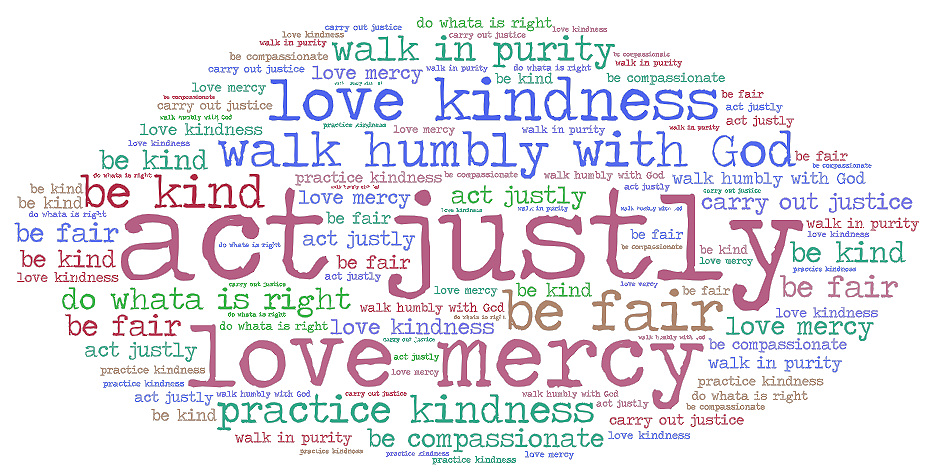
TL;DR;
Micah 6:8 spells out God’s expectations for us: to act justly, love mercy, and walk humbly with God. This webpage notes a parallel between Micah’s message and Jesus’ Beatitudes (Matthew 5). Both passages depict how Christ’s Kingdom contrasts sharply with worldly values. Bottom line: Micah 6:8 remains profoundly relevant today — it calls believers to live a just, compassionate, and humble life that reflects God’s character and transforms society.

What does God want to say to us today through Micah 6:8?
"What does the Lord require of you but to do justice, and to love kindness, and to walk humbly with your God" -- Micah 6:8
I remember a visit some years ago with Piera, a former Italian Christian. She said to me, with a sophisticated air, "When I was young, I was really active in the church youth group at Florence. But I'm beyond all that now."
Obviously, Piera had not left the Kingdom to catch up with the world but had rather slid back into its traps.
Of course, the world does often view us as "backward." And once in a while, we have warned each other about the dangers of "trying to keep up with the world."
But the truth is, the world has not caught up with the ideals and requirements of the Beatitudes from the Sermon on the Mount.
In Matthew 5, Jesus reminds us that God's values are often the reverse of those held by the world. The verses call forth so clearly the kind of lifestyle Jesus expects of His followers. Rewards abound to those who exhibit Beatitude characteristics.
Matthew 5 has been called "the Constitution of Christ's Kingdom."
Here, we are shown how we can have the privilege of being in Christ's kingdom and reigning with Him -- a privilege human beings lost through disobedience. We are, of course, created to reign with Christ. However, Adam and Eve sought to rule in their own way and in that way became slaves to sin. There, in the Garden of Eden, the human race fell. It did not rise as Piera seemed to think.
What application does this Bible passage have to my life today? First, it reminds me of attitudes and actions that are just as important as the principles found in the Ten Commandments given in Exodus 20.
How does my life measure up to the Kingdom standards of meekness, humility, mercy, peacemaking, and the longing to be filled with righteousness? Is my lifestyle truly a "beatitude lifestyle"?
Occasionally, some have facetiously said that the third work of grace is being "petrified." That is just not so. We can be saved and sanctified and still have lots of room to grow in the measure of Beatitudes.
One of the joys of discipling new Christians is watching them take giant forward leaps in spiritual maturity. That kind of progress is less visible -- and, unfortunately, even sometimes non-existent -- in the lives of Christians who have been in the faith for a while.
We must feel challenged to fear "spiritual petrification" almost as much as outright sin itself. Let's be committed to letting the Holy Spirit use Matthew 5 to help us formulate and, with His power, carry out some self-improvement plans designed to make us better citizens of Christ's Kingdom.
Blessed are those who hunger and thirst after righteousness (Matthew 5:6).
I wrote this devotional blog post when Barbara and I were serving as missionaries in Italy. It originally appeared in Standard, a Faith Connections take-home curriculum piece for adult Sunday school classes published by The Foundry.
-- Howard Culbertson, hculbert@snu.edu
Micah 6:8 says, "He has shown you, O mortal, what is good. And what does the Lord require of you? To act justly and to love mercy and to walk humbly with your God."
Bottom line: Micah 6:8 sets forth values that will contribute to a just, compassionate, and spiritually fulfilling life. This verse is thus particularly relevant for our day.
Memorable Quotes About Other Bible Verses
M – Move through life with justice in your stride.
I – Inspire compassion with every act of mercy.
C – Choose the humble path over prideful gain.
A – Act not for praise, but in reverence to God.
H – Honor Him by walking closely in His ways.
Like acrostics? Here are more of them